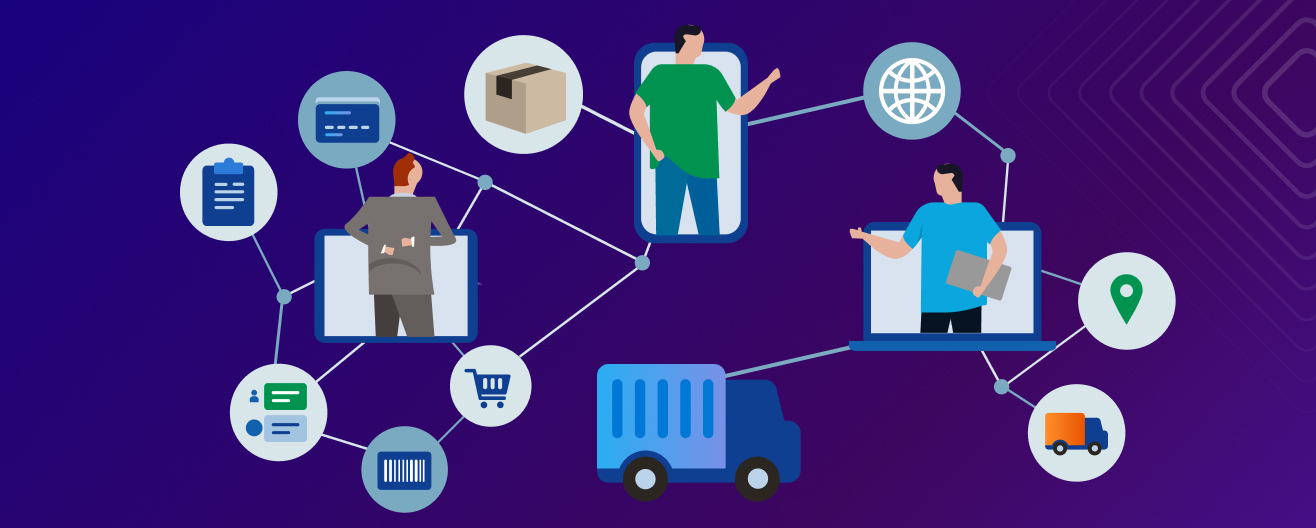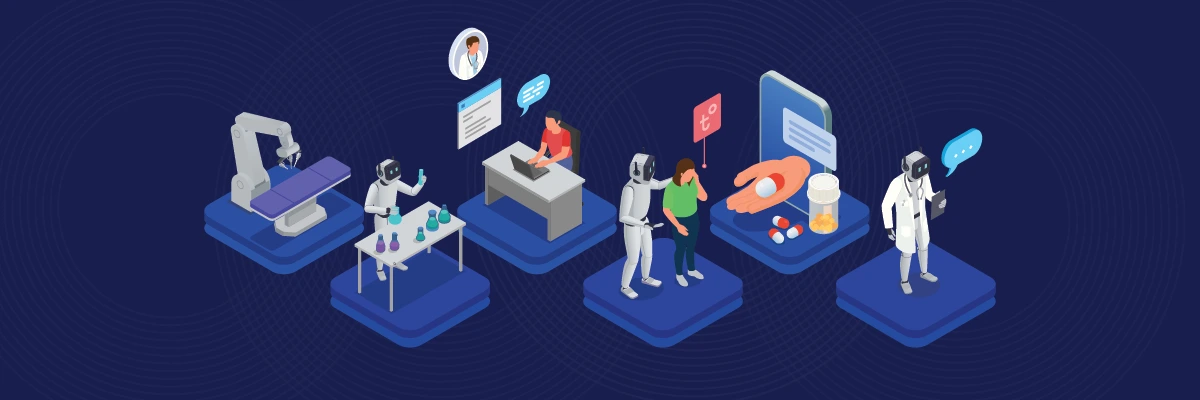
Today, keeping medical records safe is a big challenge. With so much patient information stored online, there is a risk of hackers stealing or altering that data. Traditional systems often fail to protect sensitive information.
That’s where blockchain technology can help. It’s a new way to store and share data that is very secure. Once something is added to a blockchain, it can’t be changed or deleted, which makes it harder for anyone to tamper with the records.
Only people with permission can access the data, and everything is recorded in a clear and open way. This helps hospitals, doctors, insurance companies, and even patients feel more confident that their information is safe and private.
In this blog, we will look at how blockchain can solve the problems with medical data security and how it could make healthcare better, safer, and more trusted in the future.
Blockchain is transforming healthcare with secure, efficient, and transparent solutions.
Big partnerships include:
->Mayo Clinic & Trial (Sep 2022).
->Trial & Crucial Data Solutions (Mar 2022).
->Baptist Health & Chronicled (Jul 2023).
In 2025, more and more companies are turning to blockchain business solutions to solve common problems like data fraud, lack of transparency, and system failures. So, what makes blockchain so powerful for business?
It all comes down to its core features: decentralization, immutability, transparency, and traceability. Let’s explore these in simple terms and see how they help solve real-world business challenges.
Traditional systems store data in one central place, like a server. If that server crashes or gets hacked, everything is at risk. However, blockchain is decentralized, which means data is stored across multiple computers simultaneously. No single company or person has full control.
It makes systems stronger, safer, and more reliable. It also removes the need to trust a middleman, which is great for partnerships or supply chains.
One of the most valuable parts of blockchain is that once data is written, it can’t be changed. This is called immutability. Think of it like writing in pen instead of pencil; there’s no erasing.
This is important in industries like finance, legal, and healthcare, where records must stay accurate and unchanged.
All blockchain transactions are transparent and traceable. That means every entry has a clear history of who made it, when, and why. It’s easy to track a product from the factory to the customer or monitor a payment from sender to receiver.
This is especially useful in supply chain management, logistics, food safety, and even customer service.
Blockchain uses cryptography to protect data. Information is encrypted, and access is controlled using public and private keys. Only users with the right private key can unlock and view sensitive data. This keeps business information safe and out of the wrong hands.
Medical data contains very private information like your name, age, address, health problems, test results, and insurance details. If this data is not properly protected, hackers can break into hospital systems and steal it. It is a big risk because stolen medical data can be used to commit fraud, misuse your identity, or even cause emotional harm.
For example, if someone hacks into a hospital’s computer, they could steal your identity and use your insurance to get treatment or buy expensive medicine. They might also access your medical history and share it without your permission. In some cases, hackers even blackmail people by threatening to release private health information unless they are paid.
That’s why medical data security is important. To protect this data, hospitals are starting to use blockchain technology in healthcare. Blockchain keeps records safe, secure, and unchangeable. It gives patients more control over who can see their information and helps stop hackers from stealing or misusing medical data.
In the healthcare world, keeping medical data safe, accurate, and easy to share is a huge challenge. Patients often visit multiple hospitals, labs, and specialists, each using different systems. These systems usually don’t talk to each other, and that leads to missing records, delays in treatment, and privacy risks. This is where blockchain technology in healthcare comes in as a game-changer.
Blockchain is like a digital ledger that securely stores information across many computers instead of one central place. It brings trust, transparency, and better control to medical data. Here’s how it helps:
Medical data includes personal and sensitive details such as prescriptions, diagnoses, lab results, and even genomic data. If this information falls into the wrong hands, it can cause serious harm. Blockchain uses cryptographic security, which means the data is encrypted and protected using unique digital keys.
Only people with the right private key can unlock and access the data. This makes it extremely difficult for hackers or unauthorized users to read or tamper with medical information. That’s why blockchain for data security and transparency is becoming essential in modern healthcare systems.
In traditional systems, hospitals or insurance companies control patient records. Patients have little say in who accesses their data and when. With blockchain-based healthcare solutions, this changes completely.
Patients can give permission to doctors, specialists, or labs to view their records and take back access at any time. This concept, called self-sovereign identity, gives patients true ownership of their health data.
A big reason why businesses should use blockchain in healthcare is to boost patient privacy and trust.
Different hospitals and clinics often use different software. This creates barriers when trying to share information between them. Blockchain creates a Unified, decentralized record that can be safely shared across systems.
Even though the data itself is stored off-chain (in encrypted form), blockchain holds metadata such as timestamps and access permissions, making systems interoperable and records consistent across providers.
This helps solve the issue of EHR interoperability and allows smoother, more connected patient care.
Every time someone accesses or updates a patient’s data, the blockchain records that action with a timestamp. This makes it easy to track who did what and when. Nothing can be changed or erased without leaving a trace.
This kind of audit trail is very helpful in maintaining accountability and trust, especially in legal, insurance, or research-related healthcare activities. One of the top benefits of blockchain for healthcare businesses is traceability and transparency.
Billing and claims in healthcare are complex and often abused. Insurance fraud, such as charging for services not provided, is a major financial burden.
Blockchain uses smart contracts to automate and verify claims. These contracts execute automatically when conditions are met, such as verifying treatment or checking insurance validity.
This reduces paperwork, stops fraud, and speeds up payments. A real example of how blockchain helps businesses in 2025 is by cutting costs and improving efficiency.
Genomic data is very personal and valuable. It helps in creating personalized medicine, but it must be kept secure.
Blockchain-powered platforms such as Nebula Genomics let individuals store, share, and even sell their DNA data for research while staying anonymous and protected.
The use of blockchain ensures that their identity and choices are respected at every step. Shows how blockchain is helping personalized medicine and data privacy.
With wearable devices and home health sensors (like heart monitors or glucose trackers), real-time health data is being generated more than ever. But how do we know that this data is real and hasn’t been altered?
Blockchain works with edge computing to verify and encrypt this data before storing it securely.
Doctors can access accurate, tamper-proof reports, helping with remote treatment and decision-making. One of the newer blockchain use cases is for companies developing remote healthcare tools.
As technology advances, so do the risks of data misuse, cyberattacks, and medical errors. That’s why many medical organizations are now turning to blockchain in healthcare.
Its secure, transparent, and efficient technology offers a better way to manage sensitive data. Let’s explore the top benefits of blockchain for businesses in the healthcare industry.
In today’s fast-changing digital world, businesses are constantly seeking smarter and safer ways to manage their operations. One powerful tool gaining popularity is blockchain technology. Known for its security, transparency, and decentralization, blockchain is helping solve common problems faced by enterprises. Let’s explore some real-world blockchain applications in business.
Blockchain is helping various industries improve trust, security, and speed by solving key operational and data management challenges effectively.
Blockchain tracks products in real-time across the supply chain. Every transaction or movement is recorded, reducing fraud and ensuring quality control. Companies gain visibility into sourcing, production, and delivery.
Blockchain speeds up payments and removes intermediaries. Smart contracts automatically carry out agreements once conditions are met, reducing errors and delays. This is especially useful in insurance, real estate, and B2B payments.
Blockchain ensures that sensitive medical records are secure and only accessible to authorized individuals. This prevents breaches and ensures compliance with data regulations. It’s a perfect example of using blockchain for data security and transparency.
Enterprises now use blockchain to manage digital identities. It allows for secure logins, employee verification, and safer customer onboarding without depending on traditional passwords or manual checks.
Medical data breaches can expose sensitive patient information, damage a hospital’s reputation, and lead to serious legal issues. As healthcare systems move to digital platforms, protecting electronic health records (EHRs) becomes more important than ever.
That’s where advanced tools such as Blockchain for Medical Data Security come into play. Here are key ways to prevent breaches and keep patient information secure:
Yes, blockchain is safe for storing patient data, especially when it’s used with strong privacy practices. It keeps data secure by using encryption, which turns information into a secret code.
Only people with permission can read or use it. Every time someone opens or changes a record, the blockchain automatically saves the time, date, and action. This makes it nearly impossible for hackers to change or steal the data without getting caught. That’s why blockchain for medical data security is becoming popular in hospitals and clinics.
Another big advantage is data privacy in healthcare with blockchain. Patients have more control; they can decide who sees their medical records and for how long. Because the blockchain is stored across many computers, there’s no single point a hacker can attack.
Real tools such as MedRec and IBM’s healthcare blockchain show how this technology helps protect patient data using blockchain. These are real blockchain use cases in healthcare security that prove it works well and builds trust between doctors and patients.
HIPAA laws are designed to protect patient health information and ensure privacy across all healthcare systems. As digital health records become more common, staying compliant is harder, but blockchain helps solve this.
Blockchain for medical data security keeps records encrypted, time-stamped, and traceable. This means only authorized people can access the data, and every action is logged. This transparency supports HIPAA compliance using blockchain by making it easier to audit data access and prevent misuse.
The benefits of blockchain in health data protection go beyond security. It strengthens data privacy in healthcare with blockchain by giving patients more control over their information.
With real blockchain use cases in healthcare security, hospitals can better prevent medical data breaches and avoid fines. Whether you’re wondering how blockchain secures medical data or if blockchain is safe for storing patient data, the answer is yes, especially when it’s designed to support HIPAA standards and protect patients at every step.
Medical data is personal, valuable, and powerful. It must be protected not just from hackers, but also from misuse or carelessness. This is where blockchain for medical data security plays a key role.
It offers a safer and smarter way to store, share, and protect patient information. By using blockchain to secure medical data, patients get full control over who can access their records.
From protecting patient data using blockchain to creating transparency, this technology is changing how we manage healthcare information. As more hospitals understand how blockchain secures medical data, it could soon become a standard part of systems everywhere.
Technical Content Writer
Kavita has a strong background in technology and writes about cybersecurity, software development, and digital marketing. She makes complex topics simple and easy to understand. Her content helps businesses, developers, and marketers learn about cybersecurity threats, best practices, software development, and digital strategies to stay informed and succeed online.



